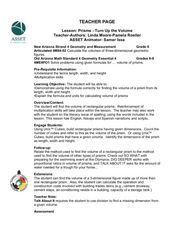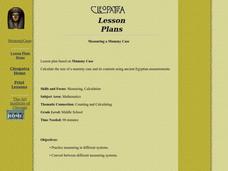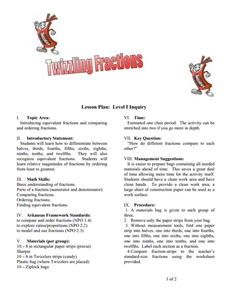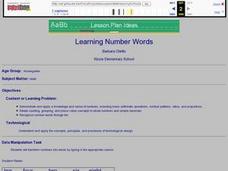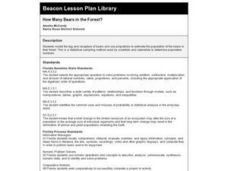Curated OER
Prisms-Turn Up The Volume
Identify the length, width, and height of prisms. Critical thinkers calculate the volume of prisms given small amounts of information. They derive the formula given the length, width and height.
Curated OER
Identify Similar Figures
Students explore the concept of similar figures. In this similar figures lesson plan, students develop the idea that similar figures are a different size but the same shape by comparing similar rectangles. Students use patty paper to...
Curated OER
Similar Triangles - Applied Problems
Students differentiate between similar and congruent triangles. In this geometry lesson, students identify the angles of triangles using the similarity theorem. They apply concepts of triangles to the real world.
Curated OER
Similarity and Congruence
Students explore the concept of similarity and congruence. In this similarity and congruence lesson, students identify and verify whether or not two figures are similar, congruent, or neither. Students use postulates and theorems such as...
Curated OER
Similarity and Congruence
Learners explore the concept of similarity and congruence. In this similarity and congruence lesson, students cut out strips of paper and form a triangle. Learners try to prove that their triangles are congruent using the SSS theorem of...
Curated OER
Measuring a Mummy Case
Students practice how to calculate volume using mummy cases. They measure using ancient Egyptian, U.S., and metric systems. They explore how to convert measurements into different systems, and discuss ratios.
Curated OER
Converting fraactions and percents
Sixth graders practice the conversion of percents and fractions. They focus on the fact of both fractions and percents are part of a whole. In the independent practice the students also work with solving proportions.
Curated OER
Measuring a Mummy Case
Students calculate the size of a mummy case and its contents using ancient Egyptian measurements.
Curated OER
New Deck: Percents
Fifth graders observe and demonstrate the meaning of percents by creating a new deck of fifty-two cards. They meet a specified criteria, with a specific percent of the cards being prime numbers, eight's, multiples of five, face cards,...
Curated OER
Lesson Plan: Using Maps and Scales to Get to the Basketball Hall of Fame
Students view a quicktime video of basketball players going from Atlanta to Springfield, Mass. For this scaling lesson, students use a map to calculate the distance of the trip and the length of travel time. Students apply ratio and...
Curated OER
Building Sets of 13 and 14
Compose and decompose sets of 13 and 14 and compare sets of each with your little learners. They use objects to construct sets of 13 and 14, record their answers, and compare sets in several different ways.
Curated OER
Exploring Biomes Lesson 3: Endangered Biomes
Future environmental scientists compare data from two different conservation strategies. Alone this lesson is sufficient, but as part of the Exploring Biomes unit produced by the Arizona Fish and Game Department, it becomes top-notch.
Curated OER
The Right Stuff
Studentsare introduced to the Pythagorean Theorem by exploring right triangles and the squares built on each side. They apply the Pythagorean Theorem to real-world problems. Students u se informal and nonformal arguments of proof (i.e.,...
Curated OER
A Special Relationship
Learners discover the relationships of the lengths of the sides of right triangles and right triangles using a series of drawings on dot paper. They investigate and solve problems of standard (customary and metric units) and non-standard...
Curated OER
Statistics with M&Ms
Seventh graders explore estimation, measurement, and probability. Students conduct surveys and create charts & graphs. They study the history of chocolate. Students design their own magazine advertisement or create a script for a...
University of Arkansas
Twizzling Fractions
Using food as a manipulative is one of the best ways to incorporate hands-on learning in the classroom. This hands-on approach allows young mathematicians to compare, order, and identify fractions with the use of Twizzlers® and...
Curated OER
You Can't Go Wrong with a Right Triangle 2
Upper graders use the properties of right angle trignonmetry to measure objects such as the school flagpole. They solve real world problems using these properties.
Curated OER
Positive and Negative Numbers
Pupils use blocks and markers to illustrate the processes of adding, subtracting, multiplying and dividing integers. In this mathematics lesson, learners use Algebra blocks to demonstrate multiplying polynomials.
Curated OER
Learning Number Words
Students practice saying their numbers and identifying the words. They use whole numbers and decimals to practice grouping numbers into different categories. They write the word of the number they are shown.
Curated OER
Buying My First Car
Students pretend they are about to buy their first new car. They must do all the calculations necessary to estimate the cost of purchasing the car. They see that the math they learn in school really does have real-life applications.
Curated OER
How Many Bears in the Forest?
Third graders model the tag and recapture of bears and use proportions to estimate the population of the bears in their forest. This is a statistical sampling method used by scientists and naturalists to determine population numbers.
Curated OER
OUT OF THIS WORLD AND INTO OUR CLASSROOM
Pupils create projects on Astronomy using math concepts and use of Internet resources.
Curated OER
Cartography
Students research about cartography and how to be a cartographer. In this math lesson, students draw a map of their classroom. They use a robot to explore navigation using a compass rose.
